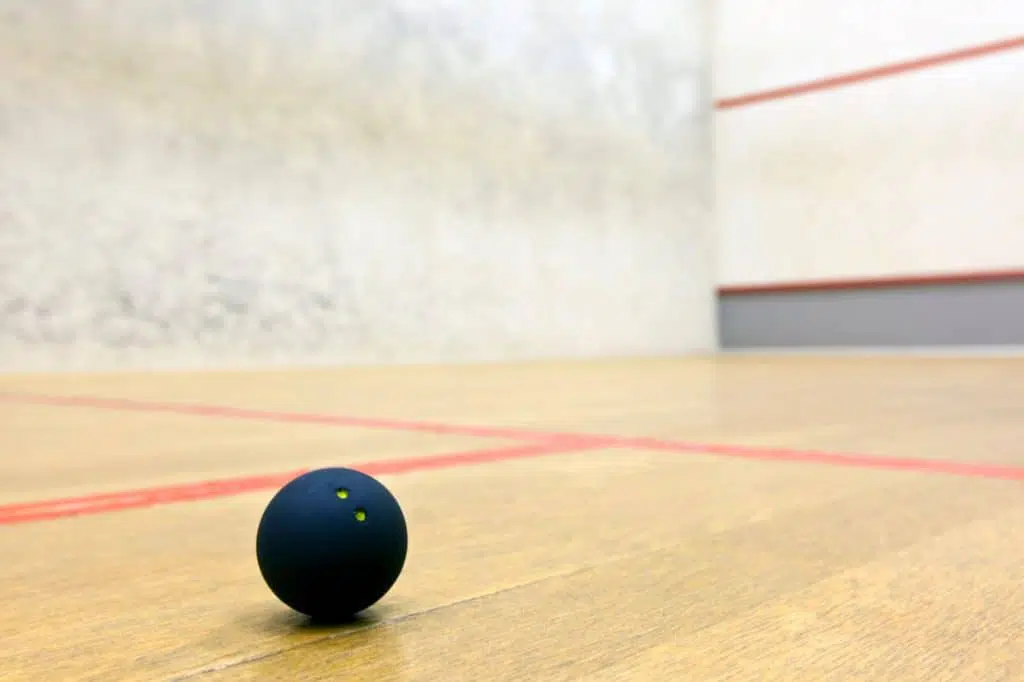When they first get into squash, many players question whether it is played outside anywhere. It seems like the perfect sport to be played in a park in the summer months when it is dry and the ball will still be bouncing OK, but is squash ever played as an outdoor sport, or is it more indoor?
Squash is mostly an indoor game, with all major tournaments in both the amateur and professional game being played inside. Squash is a winter sport in most parts of the world, and so is played indoors in heated courts to keep the ball bouncing well.
However, there are certainly some outdoor courts around the world, and there have been outdoor courts in the history of squash as well.
In this post, I’ll take a look at:
- The seven biggest reasons why squash isn’t played outside
- The times when squash is played outside

Squash Is Mostly An Indoor Game
The vast majority of squash matches take place on indoor courts. This is the case throughout the sport, and at different standards, and in different countries.
For example, the World Open and British Open, the two biggest events of each season, always take place on an indoor court.
Also, amateur league squash takes place on indoor courts, as open championships open to all players.
Pretty much all squash clubs and facilities provide indoor courts, but almost nowhere has outdoor ones.
Indoor courts offer many benefits, including:
- They are easier to maintain the optimum temperature in. This keeps the ball bouncy, without making conditions unsafe
- Squash can be played all year round
- You can play at night-time as well as day
- You can play in all manner of weather
7 Disadvantages Of Playing Outdoors
There are a few major reasons why playing outdoors has never really caught on.
Some of these are:
1. Four Walls
You already need four walls to create a squash court, so why not add a roof?
The simple creation of a roof means that the squash court can be used in all temperatures and all weathers.
The roof also keep rain out of the court, which means the walls and flooring will last much longer in a good state of condition.
2. It’s A Winter Sport
Squash is primarily a winter sport in most countries. This means that it is played at the coldest time of year.
If the court is outside, then the temperature of the floor and walls, as well as the air inside the court would all be too cold.
Squash balls need to be warm to bounce enough to create a good game. A stone-cold squash ball would completely kill the outdoor match in cold weather.
3. Flooring
The standard flooring in squash is wood slats.
However, if the court was open to the elements this would be impossible. Rain would quickly damage the floor, which would buckle and become misshapen and distorted.
A different surface would have to be found, such as concrete or rubber.
These would create a very different type of bounce of the ball, and game in general.
4. High Temperatures In Summer
This is not completely insurmountable, but in the height of summer in some countries, squash matches could be very uncomfortable even slightly dangerous in the high heat.
The huge amount of physical exertion that takes place in every match does not go well with sun and high temperatures
5. Some Attempts Have Failed
There have been attempts to get outdoor squash going in certain parts of the world, but these seem to have met with failure.
I read about a keen squash player in Canada that invested a lot of money into building an outdoor squash court at a park where he lived.
Unfortunately, the court never got much use, and in the end, was abandoned.
6. Dangerous In Rain
Any type of rain would make squash quite hard to play. It could potentially make the flooring slippy, and also the ball would slide and skid off all the surfaces.
7. 24-Hour Play Would Be Hampered
Squash is often played in darkness.
Personally, I rarely play in daylight, usually just playing in the evenings in Autumn and Winter. Indoor courts allow for lighting, so you can literally play 24 hours a day.
Indeed some squash clubs do offer this facility. Outdoor squash courts are of course limited to just daytime play unless, of course, you created some kind of floor lighting system.
| Disadvantages Of Playing Outdoors | Reason Why Indoors Is Better |
| You need four walls | If you’ve bothered to build four walls, you might as well build a roof! |
| It’s a winter sport | It’s played at the coldest time of the year |
| Flooring | Wooden floorboards would be destroyed by weather |
| High temperatures in summer | Make playing uncomfortable |
| Past attempts have failed | It’s been tried before (and failed!) |
| Dangerous in rain | Very slippy! |
| 24-hour play hampered | Unless you had flood-lights |
Some Examples Of Outdoors Squash
However, squash is not solely an indoor game, and there are times when it is played outside, both now and in the past.
Squash was first invented at Harrow school, and independent educational establishment that is one of the oldest and most exclusive schools in the United Kingdom.
When it was first played, the courts used where quite dangerous, containing water pipes and other obstacles that the players had to avoid. The school then built four outdoor squash courts to make up for this, and this is where the sport began its formative years.
Another time when squash is sometimes played outside is during a big professional tournament that is held in an outdoor space so as to gain more seating.
For example, a tournament might be held in a glass court in the middle of a tennis court, with all the seating around the court.
I found a youtube video of a squash match in these circumstances. It was a super series tournament in 1998 at the Hatfield Galleria in the UK. In this match, Jansher Khan is playing Peter Nicol:
There are also some parks throughout the world that do have outdoor squash courts. They are not totally unique. They are just much less found and used, than indoor facilities.
Which Other Racket Sports Are Outdoor Games?
Many racket sports are played predominantly outside.
The big one that many squash players get involved with is tennis. There are many racket sports enthusiasts that play squash in the winter, and tennis in the summer. The seasons of the two are perfectly aligned to each other, with there being little overlap.
Also, because the skills involved in the two sports are quite similar, the two usually complement each other.
Although the two techniques are different, most squash players find advantages to playing sports like tennis in the off-season. Some benefits include:
- Maintaining agility
- Developing hand-eye coordination
- Sharpening reflexes
- Maintaining footwork and movement
- Developing racket control
Most tennis around the world is played outdoors, though it can of course be played indoors.
Although badminton is commonly viewed as an indoor sport, there is a surprisingly large amount of it played outdoors, particularly in Asia.
There are variations of badminton, that are also often played outside. These include:
- Speedminton – played with a ball and two rectangular court markings on the floor
- Ball Badminton – This is played predominantly in India. It uses a woolen ball, that flies slower through the air than a standard ball, a bit more in the manner of a shuttlecock
Tennis also has some variations of the standard sport, that are regularly also played outside. These include:
- Platform tennis – This variant of tennis has developed in the US. It is played on a small court on a heated platform. The surface is able to melt snow, so games can take place even in the dead of winter.
- Beach tennis – This is kind of like a cross between tennis and beach volleyball and is popular in countries such as Brazil
- Soft tennis – is a game that is popular in many parts of Asia. It is similar to normal tennis but uses a much softer ball
Next Steps
One of the drawbacks of playing on a hot indoor squash court is that the ball bounces much higher, and powerful players use that to their advantage. I have written a full guide on how to play against hard-hitting opponents that you can read here.
